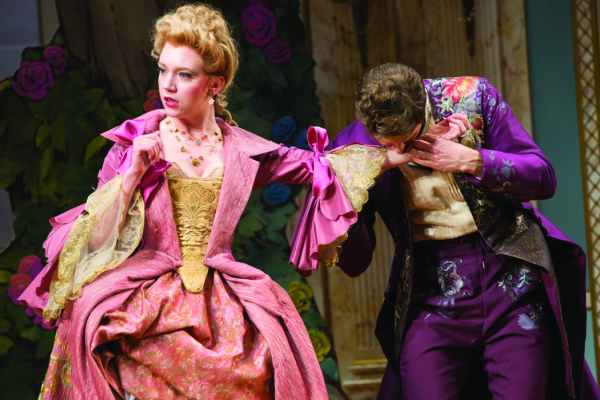The Metromaniacs

(© Scott Suchman)
The Shakespeare Theatre Company (STC) has just opened a superb new world-premiere of a little-known, 18th-century French masterpiece, The Metromaniacs. The show's brilliance is due to the collaboration between the play's translator and adapter, David Ives, and STC's artistic director, Michael Kahn, who directs.
It takes the equivalent of a grand magic trick to successfully translate a play from one language to another. As he has shown in his partnership with the STC in his translations from French to English of The Heir Apparent (2011) and The Liar (2010), Ives is a master magician.
The Metromaniacs, literally "an obsession with writing poetry," is adapted from La Métromanie, a satire of society and its self-delusion that was written in 1738 by Alexis Piron. The original shows his characters living lives based on fantasy, in which identity is wholly unstable.
The play is about a penniless would-be poet, Damis, who has fallen in love with the works of a mysterious poetess, Mlle. Meriadec de Peaudoncqville. The real Mlle. Meriadec is actually a middle-aged, male lover of poetry and drama named Francalou, a wealthy gentleman who enjoys putting on amateur plays in his Parisian home.
Francalou's main problem in life is keeping his young daughter, Lucille, away from Dorante, the son of his sworn enemy. When Damis appears, Francalou sees a solution to his problem: He pretends to Damis that the poetess he seeks is Lucille. Using disguises, mistaken identities, pseudonyms and as many as three personalities for each character, Ives produces multiple outrageous plots that unravel simultaneously, creating a sense of total chaos.
Yet in the end, order is established. More significantly, Ives has written the play in extremely funny rhyming couplets, providing a subtle sense of order and structural definition to every line.
The Metromaniacs will always be a delightful script, but this is a sensational production because of Michael Kahn's intelligent direction. Kahn directs to the play's comedic core, allowing his actors to make virtually every other line a laugh line. Although he keeps the play moving at breakneck speed, as must be done with this delicate farce, Kahn never lets the play go so fast that the audience gets lost trying to tease out the various plots.
Finally, in a work that depends on light-as-soufflé language, Kahn's actors vocally emphasize unreality and artificiality, the real subjects of the play, without drawing attention to the fact that they are rhyming.
Christian Conn is delightful as Damis, who's looking for love and the perfect rhyme, forever scribbling, then tucking the white quill in his breast pocket. Anthony Roach is equally well cast as the second young lover, Dorante. Roach is hilarious as the clumsy, would-be scribe who can't write a single word of love.
Lucille, "a woman in love with poetry," is played with grace and humor by Amelia Pedlow. She first appears in a gorgeous raspberry-pink gown and flounces across the stage sounding like a savvy Valley Girl, tossing off an occasional bored "whatever."
Dina Thomas plays Lucille's maid, Lisette, who is far smarter than the aristocrats around her. Like Lisette, Damis' valet, Mondor (Michael Goldstrom), is far more aware of reality than are the aristocrats onstage.
Adam LeFevre is an appropriately big, blustery Francalou. And Damis' uncle is played well by Peter Kybart.
James Noone's set underscores the antirealism of this play. It shows the massive ballroom of Francalou's house, where a stage has been built to represent a forest filled with great, cartoonish cutouts of trees and colorful flowers.
Murell Horton's exquisite period costumes help distinguish characters by social role. When Lisette changes from her maid's costume to a gown identical to Lucille's raspberry gown, it sets off a whole new set of misunderstandings and misadventures.
Piron's play was written in response to an actual event involving Voltaire. Although Ives doesn't satirize a contemporary figure, his sense of the anarchy that arises when people don't know who they are is spot-on. That Kahn's direction is so well matched to Ives' writing is a stroke of good luck for Washington's theater community.










